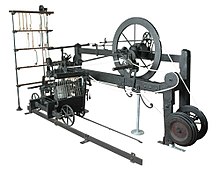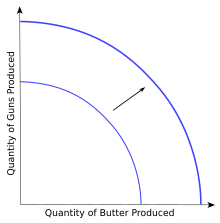Ad
-
Technology Vision 2019
The Post-Digital Era Is Upon Us.
5 Trends Will Shape The Future.Accenture Careers
View Career Options Available At
Accenture. Help Build The Future.
Search Results
Web results
Jan 14, 2016 - We stand on the brink of a technological revolution that will fundamentally alter the way we live, work, and relate to one another. In its scale ...
Jan 18, 2018
Jan 19, 2016
This Fourth Industrial Revolution is, however, fundamentally different. It is characterized by a range of new technologies that are fusing the physical, digital and ...
Web results
Aug 13, 2018 - We're on the cusp of the Fourth Industrial Revolution, or Industry 4.0. It's quite different than the three Industrial Revolutions that preceded ...
People also ask
Videos
Web results
World-renowned economist Klaus Schwab, Founder and Executive Chairman of the World Economic Forum, explains that we have an opportunity to shape the ...
begin quote from:
A technological revolution is a period in which one or more technologies is replaced by another ... The phrase Fourth Industrial Revolution was first introduced by Klaus Schwab, the executive chairman of the World Economic Forum, in a 2015 ...
Jan 17, 2019 - The Fourth Industrial Revolution will take center stage at the World Economic Forum's (WEF) annual meeting next week in Davos, Switzerland.
Technological revolution
This article is written like a personal reflection, personal essay, or argumentative essay that states a Wikipedia editor's personal feelings or presents an original argument about a topic. (April 2017) (Learn how and when to remove this template message)
|
A technological revolution is a period in which one or more technologies is replaced by another technology in a short amount of time. It is an era of accelerated technological progress characterized by new innovations whose rapid application and diffusion cause an abrupt change in society.
A technological revolution is made of interconnected technological changes.
Contents
Description by Joseph C. Galisim[edit]
A technological revolution increases productivity and efficiency. It may involve material or ideological changes caused by the introduction of a device or system. Some examples of its potential impact are business management, education, social interactions, finance and research methodology; it is not limited strictly to technical aspects. Technological revolution rewrites the material conditions of human existence and can reshape culture. It can play a role of a trigger of a chain of various and unpredictable changes:[1]
The consequences of a technological revolution are not necessarily positive. For example, innovations, such as the use of coal as an energy source, can have negative environmental impact and cause technological unemployment. The concept of technological revolution is based on the idea that technological progress is not linear but undulatory. Technological revolution can be:
- Sectoral (more technological changes in one sector, e.g. Green Revolution and Commercial Revolution)
- Universal (interconnected radical changes in more sectors, the universal technological revolution can be seen as a complex of several parallel sectoral technological revolutions, e.g. Second Industrial Revolution and Renaissance technological revolution)
The concept of universal technological revolutions is a key factor in the Neo-Schumpeterian theory of long economic waves/cycles[3] (Carlota Perez, Tessaleno Devezas, Daniel Šmihula and others).
History[edit]
The most known example of technological revolution was the Industrial Revolution in the 19th century, the scientific-technical revolution about 1950–1960, the Neolithic revolution, the Digital Revolution and so on. The notion of "technological revolution" is frequently overused, therefore it is not easy to define which technological revolutions having occurred during world history were really crucial and influenced not only one segment of human activity, but had a universal impact. One universal technological revolution should be composed from several sectoral technological revolutions (in science, industry, transport and the like).
We can identify several universal technological revolutions which occurred during the modern era in Western culture:[4]
- 1. Financial-agricultural revolution (1600–1740)
- 2. Industrial revolution (1780–1840)
- 3. Technical revolution or Second Industrial Revolution (1870–1920)
- 4. Scientific-technical revolution (1940–1970)
- 5. Information and telecommunications revolution, also known as the Digital Revolution or Third Industrial Revolution (1975–present)
Attempts to find comparable periods of well defined technological revolutions in the pre-modern era are highly speculative.[5] Probably one of the most systematic attempts to suggest a timeline of technological revolutions in pre-modern Europe was done by Daniel Šmihula:[6]
- A. Indo-European technological revolution (1900–1100 BC)
- B. Celtic and Greek technological revolution (700–200 BC)
- C. Germano-Slavic technological revolution (300–700 AD)
- D. Medieval technological revolution (930–1200 AD)
- E. Renaissance technological revolution (1340–1470 AD)
Potential future technological revolutions[edit]
After 2000 there became popular the idea that a sequence of technological revolutions is not over and in the forthcoming future we will witness the dawn of a new universal technological revolution. The main innovations should develop in the fields of nanotechnologies, alternative fuel and energy systems, biotechnologies, genetic engineering, new materials technologies and so on .[7]
The Second Machine Age is the term adopted in a 2014 book by Erik Brynjolfsson and Andrew McAfee. The industrial development plan of Germany began promoting the term Industry 4.0. In 2019, at the World Economic Forum meeting in Davos, Japan promoted another round of advancements called Society 5.0.[8][9]
The phrase Fourth Industrial Revolution was first introduced by Klaus Schwab, the executive chairman of the World Economic Forum, in a 2015 article in Foreign Affairs,[10] "Mastering the Fourth Industrial Revolution" was the theme of the World Economic Forum Annual Meeting 2016 in Davos-Klosters, Switzerland. On October 10, 2016, the Forum announced the opening of its Centre for the Fourth Industrial Revolution in San Francisco.[11] This was also subject and title of Schwab's 2016 book.[12] Schwab includes in this fourth era technologies that combine hardware, software, and biology (cyber-physical systems),[13] and emphasizes advances in communication and connectivity. Schwab expects this era to be marked by breakthroughs in emerging technologies in fields such as robotics, artificial intelligence, nanotechnology, quantum computing, biotechnology, the Internet of Things, the Industrial Internet of Things (IIoT), decentralizedconsensus, fifth-generation wireless technologies (5G), 3D printing and fully autonomous vehicles.[14]
Jeremy Rifkin includes technologies like 5G, autonomous vehicles, Internet of Things, and renewable energy in the Third Industrial Revolution.[15]
Relation to "technological revolution" and "technical revolution"[edit]
Sometimes the notion of "technological revolution" is used for the Second Industrial Revolution in the period about 1900, but in this case the designation "technical revolution" would be more proper. When the notion of technical revolution is used in more general meaning it is almost identical with technological revolution, but technological revolution requires material changes in used tools, machines, energy sources, production processes. Technical revolution can be restricted to changes in management, organisation and so called non-material technologies (e.g. a progress in mathematics or accounting).
List of intellectual, philosophical and technological revolutions (sectoral or universal)[edit]
- The Upper Paleolithic Revolution: the emergence of "high culture", new technologies and regionally distinct cultures (50,000–40,000 years ago).
- The Neolithic Revolution (perhaps 13,000 years ago), which formed the basis for human civilization to develop.
- The Renaissance technological revolution: the set of inventions during the Renaissance period, roughly the 14th through the 16th century.
- The Commercial Revolution: a period of European economic expansion, colonialism and mercantilism which lasted from approximately the 16th century until the early 18th century.
- The Price Revolution: a series of economic events from the second half of the 15th century to the first half of the 17th, the price revolution refers most specifically to the high rate of inflation that characterized the period across Western Europe.
- The Scientific Revolution: a fundamental transformation in scientific ideas around the 16th century.
- The British Agricultural Revolution (18th century), which spurred urbanisation and consequently helped launch the Industrial Revolution.
- The Industrial Revolution: the major shift of technological, socioeconomic and cultural conditions in the late 18th century and early 19th century that began in Britain and spread throughout the world.
- The Market Revolution: a drastic change in the manual labor system originating in the South of the United States (and soon moving to the North) and later spreading to the entire world (about 1800–1900).
- The Second Industrial Revolution (1871–1914).
- The Green Revolution (1945–1975): the use of industrial fertilizers and new crops greatly increased the world's agricultural output.
- The Digital Revolution: the sweeping changes brought about by computing and communication technology, starting from circa 1950 with the creation of the first general-purpose electronic computers.
- The Information Revolution: the massive economic, social and technological changes resulting from the Digital Revolution (after 1960?).







No comments:
Post a Comment